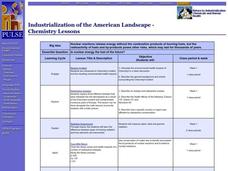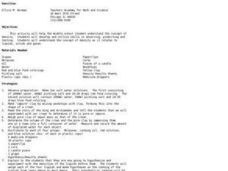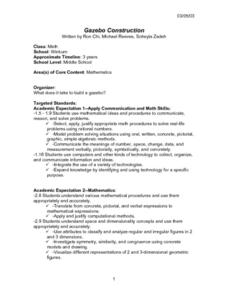Curated OER
Permafrost
Students use a thermometer to analyze soil temperature data to determine which soil sample is normal, and which one is permafrost. In this permafrost lesson plan, students participate in a hands on activity where they identify the active...
Curated OER
Hold on Tight!
Students explore the relationship between plant roots and the soil in which they grow. They examine photos of uprooted trees and desert areas and
conduct experiments designed to highlight this mutual relationship between roots and soil....
Curated OER
Introducing Ideas about Inheritance
Is it nature or nurture? In an easily adaptable kinesthetic activity to introduce genetics, learners group themselves based on a variety of categories. They will quickly find that some characteristics are easy to put in order, while...
Curated OER
Newtonian Mechanics
Students familiarize themselves, through teacher demonstration, with Gavendish's apparatus first used for experimentally determining the value of the Universal Gravitational Constant G, and calculate theoretical value of Earth's...
Alabama Learning Exchange
Inner and Outer Planets
Students explore the solar system. For this planets lesson, students learn about the other planets in the solar system. They watch a video clip from National Geographic on the solar system, compare and contrast the planets and create a...
Curated OER
SI Units and Conversions Between Them
In this SI units and conversion worksheet, students are given five problems to solve. They convert from one SI unit to another.
Alabama Learning Exchange
Effects of Friction on a Moving Block
Students investigate how friction affects the movement of a block across surface areas. They test five different kinds of surfaces—smooth surface, wax paper, a paper towel, course, and fine sandpaper. They predict and record the results...
Curated OER
Tornado!: Types and Formation
Students discuss the different types of tornadoes and how they form. Working in groups, they record journal entries by conducting experiments with water bottles simulating vortex formation.
Curated OER
Going the Distance
Students experiment in small groups to answer the question, "Is there a relationship between ramps and speed?" They apply a formula to calculate the speed of the cars used in the experiment, complete the associate lab report, and...
Curated OER
Industrialization of the American Landscape
Learners explore the Chernobyl incident and the resulting environmental health impacts. They explore three different isotopes that were released into the atmosphere. Through inquiry, students determine the difference between types of...
Curated OER
Densities
Students explore the concept of density. For this density lesson plan, students determine the density of a crown and a sample of clay. They hypothesize about the densities of 4 liquids they are given including molasses, cooking oil, a...
Curated OER
Burn, Baby Burn (Or Not)
Physics learners apply the concepts of fluid pressure input and output to firefighting. Divide your class into small groups and give them each a few cards that list nozzle type, hose length, hose size, and structure dimensions, They are...
Curated OER
Hurricane and Tornadoes Vocabulary
Quiz your young meteorologists using this simple matching worksheet. Learners inventory 16 weather-related terms, matching them to the appropriate definition on the right. There are an equal number of definitions as there are terms. A...
Curated OER
Friction Faction
Students create an experiment. In this friction lesson plan, students review the concept of friction and complete a bottle roll activity. Students work in groups to create their own friction experiment.
Curated OER
Marshland Wonders
Students review the characteristics of wetlands and list their benefits. After viewing short videos, they identify the organims that make their home in wetlands and how they have adapted. They compare and contrast the characteristics...
Curated OER
Gazebo Construction
Young scholars create and give oral proposals for the construction of a gazebo using a blueprint created with Geometer's Sketchpad. They then build a gazebo model using the blueprints created and provide evidence why it should be...
Curated OER
DOWNHILL DISCOVERIES
Students studykinetic energy, friction, drag and acceleration by relating it to the Winter Olympics. In this physical properties lesson students create tracks and determine how the course conditions affect bobsled, luge and downhill ski...
Curated OER
PLANETS IN PROPORTION
Students discover scales for both the solar bodies' relative sizes and their distances from the sun. They find equatorial circumference and volumes of their solar bodies. Students apply estimation strategies and proportioanl reasoning to...
Curated OER
Too Many Tamales
Students investigate Mexican holiday celebrations and compare them to American Christmas holidays. They conduct a Mexican Christmas Scavenger Hunt. The lesson uses a streaming video in order to engage students in the main objectives.
Curated OER
Newton: Force and Motion
In this forces instructional activity, learners use the equations for acceleration and Newton's second law to learn about different motions and forces. This instructional activity has 7 problems to solve.
Curated OER
Discovering Friction
Students watch a demonstration that introduces them to the idea that friction is a force that impedes motion when two surfaces are in contact. They work in groups to experiment with frictional force using a coffee cup on which they alter...
Curated OER
Comparison of Snow Cover on Different Continents
Students use the Live Access Server (LAS) to form maps and a numerical text file of snow cover for each continent on a particular date. They analyze the data for each map and corresponding text file to determine an estimate of snow cover...
Curated OER
Reading Trees: Understanding Dendrochronology
Learners examine tree-ring dating and discuss the lack of water the settlers in Jamestown faced. They create paper tree rings, simulate rain patterns, and describe the history of construction paper tree sequences.
Curated OER
How High Does the Atmosphere Go?
Students explain how relatively thin the atmosphere is, compared to the size of the planet, and determine the relative extent of the four major atmospheric layers.
























